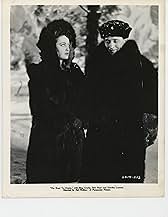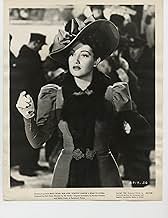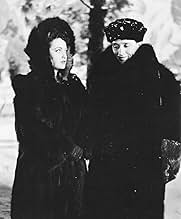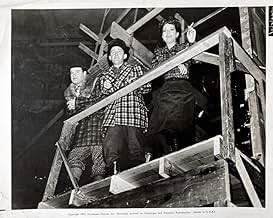NOTE IMDb
7,1/10
3,9 k
MA NOTE
Ajouter une intrigue dans votre langueTwo vaudeville flops pose as bad guys and join the Klondike gold rush with a saloon singer.Two vaudeville flops pose as bad guys and join the Klondike gold rush with a saloon singer.Two vaudeville flops pose as bad guys and join the Klondike gold rush with a saloon singer.
- Réalisation
- Scénario
- Casting principal
- Nommé pour 1 Oscar
- 3 victoires et 1 nomination au total
Jack La Rue
- LeBec
- (as Jack LaRue)
George Anderson
- Townsman
- (non crédité)
Stanley Andrews
- Joe - Official at Ship
- (non crédité)
Bobby Barber
- Bartender
- (non crédité)
William 'Billy' Benedict
- Second Newsboy
- (non crédité)
Carmella Bergstrom
- Woman
- (non crédité)
Billy Bletcher
- Bear
- (voix)
- (non crédité)
Phil Bloom
- Show Spectator
- (non crédité)
Eddie Borden
- Man in Saloon
- (non crédité)
Rudy Bowman
- Show Spectator
- (non crédité)
Avis à la une
Bob and Bing pal through this in their breezy manner, ably assisted by Dottie Lamour and especially the dry witty commentary of humorist Robert Benchley. Students of film and lovers of movies will appreciate the quality of the production, and rejoice in the knowledge that not everything funny was created after 1990.
'Road to Utopia' is a musical comedy starring two performers who are caught up in a conquest to find gold in Alaska. 'Road to Utopia' is a highly entertaining film, and it's easy to get caught up in the adventure.
Some of the comedy elements in the film are probably a little bit dated, but those that are not dated and still very funny and witty. (These include the narrator comments directed to films, the Paramount mountain, the talking animals, and the Santa figure emerging from the Alaskan landscape with gifts for Crosby and Hope). The music is also dated in terms of what traditional audiences enjoy today, but I still thought it was done very well and played an important part in the story.
'Road to Utopia' is enjoyable, and it is highly recommended. If you're tired of all the films made in the past 20-30 years, this is a gem.
Some of the comedy elements in the film are probably a little bit dated, but those that are not dated and still very funny and witty. (These include the narrator comments directed to films, the Paramount mountain, the talking animals, and the Santa figure emerging from the Alaskan landscape with gifts for Crosby and Hope). The music is also dated in terms of what traditional audiences enjoy today, but I still thought it was done very well and played an important part in the story.
'Road to Utopia' is enjoyable, and it is highly recommended. If you're tired of all the films made in the past 20-30 years, this is a gem.
Road to Utopia was one of several films made during World War II and shown to GIs before reaching the civilian public. Saratoga Trunk and The Two Mrs. Carrolls are two other examples. We have some evidence for this statement. First and foremost Robert Benchley died a year before
the film had it's premier at the New York Paramount on February 27, 1946. Benchley, noted humorist and sometime film actor, provided some off and on-screen narration for the Crosby and Hope monkeyshines. He was reputed to be a big fan of both and I think he just wanted in on the fun.
Also, Crosby recorded most of the songs for Road to Utopia on July 17, July, 19 and December 8, 1944 at Decca studios. The song Personality wasn't recorded by him until January 16, 1946, however in the film, Dorothy Lamour sang it.
It was worth the wait for the civilian public. By now the boys had the surreal nonsense down pat. Dorothy Lamour plays Skagway Sal who's father is murdered in the first minutes of the movie by killers Sperry and McGurk. Dotty beats it up to Alaska to look up Douglass Dumbrille, her dad's best friend for assistance. As Douglass Dumbrille invariably does in these films, he's looking for the goldmine her father left for himself.
The killers take the next boat with the map that they stole from Dad in hand. But they don't reckon with the sharpie and the schnook who have stowed away on the boat to Alaska. Crosby and Hope steal the map and the killer's identity.
The plot I've described so far could be a melodrama, but not in any film with the title beginning "Road to......" Between talking bears, talking fish, and a cameo appearance by Santa Claus the laughs come fast and furious.
Jimmy Van Heusen and Johnny Burke wrote the songs for this surreal madcap and gave Dotty two songs, Would You and the aforementioned Personality. Crosby got his ballad, Welcome to My Dream, and a philosophical song, It's Anybody's Spring. The last one he sang on board on a ship talent contest with Hope accompanying him on the accordion. They lost to an organ grinder and a monkey which prompted Hope to comment on the next road trip he was bringing Sinatra.
And Crosby and Hope sang Goodtime Charlie which didn't make it to vinyl and Put It There Pal probably the best known of the duets they sang together in the Road pictures. Lots of dated references in the lyrics there to Crosby's horses and their respective radio sponsors. But today's audiences would still enjoy it.
One interesting fact was that the Catholic Legion of Decency a very powerful group in those days made objections to suggestive lyrics in Personality. Hard to believe in this day and age, but as another songwriter a generation later put it, "the times, they are a changin'."
Road picture references are sometimes dated, but the laughs are eternal.
the film had it's premier at the New York Paramount on February 27, 1946. Benchley, noted humorist and sometime film actor, provided some off and on-screen narration for the Crosby and Hope monkeyshines. He was reputed to be a big fan of both and I think he just wanted in on the fun.
Also, Crosby recorded most of the songs for Road to Utopia on July 17, July, 19 and December 8, 1944 at Decca studios. The song Personality wasn't recorded by him until January 16, 1946, however in the film, Dorothy Lamour sang it.
It was worth the wait for the civilian public. By now the boys had the surreal nonsense down pat. Dorothy Lamour plays Skagway Sal who's father is murdered in the first minutes of the movie by killers Sperry and McGurk. Dotty beats it up to Alaska to look up Douglass Dumbrille, her dad's best friend for assistance. As Douglass Dumbrille invariably does in these films, he's looking for the goldmine her father left for himself.
The killers take the next boat with the map that they stole from Dad in hand. But they don't reckon with the sharpie and the schnook who have stowed away on the boat to Alaska. Crosby and Hope steal the map and the killer's identity.
The plot I've described so far could be a melodrama, but not in any film with the title beginning "Road to......" Between talking bears, talking fish, and a cameo appearance by Santa Claus the laughs come fast and furious.
Jimmy Van Heusen and Johnny Burke wrote the songs for this surreal madcap and gave Dotty two songs, Would You and the aforementioned Personality. Crosby got his ballad, Welcome to My Dream, and a philosophical song, It's Anybody's Spring. The last one he sang on board on a ship talent contest with Hope accompanying him on the accordion. They lost to an organ grinder and a monkey which prompted Hope to comment on the next road trip he was bringing Sinatra.
And Crosby and Hope sang Goodtime Charlie which didn't make it to vinyl and Put It There Pal probably the best known of the duets they sang together in the Road pictures. Lots of dated references in the lyrics there to Crosby's horses and their respective radio sponsors. But today's audiences would still enjoy it.
One interesting fact was that the Catholic Legion of Decency a very powerful group in those days made objections to suggestive lyrics in Personality. Hard to believe in this day and age, but as another songwriter a generation later put it, "the times, they are a changin'."
Road picture references are sometimes dated, but the laughs are eternal.
How does this zany mid-1940's comedy/musical rate in the year 2003? I'm going to venture a guess and suggest that it probably doesn't rate as high with viewers as it may have when it was originally released. Some of the gags and one-liners seem to be about pop-culture that is obscure in the new millenium. I had a strong sense that parts of the movie were originally funny but that the humor is lost on viewers who were not alive in the 1940's.
Notwithstanding, there are some very funny bits and one-liners in this film. Here and there throughout the film, the comedy clicked and I found myself laughing out loud. On the other hand, I have watched the film twice and both times that I watched it, I was growing tired of the endless one-liners to the point that they were becoming annoying. This film definitely seems to lose quite a bit of its comic sparkle by the end, and the ending is truly idiotic.
On the other hand, I did truly enjoy several of the songs in this movie. Two that stand out are Bing Crosby singing "Welcome to My Dream" and Dorothy Lamour singing "Personality". Unfortunately, some of the good songs, especially "Welcome To My Dream" seem a bit out of place in this zany movie!
Hillary Brooke, a fine 1940's actress who appeared in a couple of Sherlock Holmes movies is totally wasted in this comedy. She looks as though she is sleepwalking through her part. Her on-screen performance comes across as if she doesn't want to be participating in this move. She is far more competent as an actress than this movie would lead you to believe.
This movie is not for all tastes. Bob Hope and Bing Crosby fans may enjoy it, but time has not been kind to this movie. I give it a 7 out of 10 points.
Notwithstanding, there are some very funny bits and one-liners in this film. Here and there throughout the film, the comedy clicked and I found myself laughing out loud. On the other hand, I have watched the film twice and both times that I watched it, I was growing tired of the endless one-liners to the point that they were becoming annoying. This film definitely seems to lose quite a bit of its comic sparkle by the end, and the ending is truly idiotic.
On the other hand, I did truly enjoy several of the songs in this movie. Two that stand out are Bing Crosby singing "Welcome to My Dream" and Dorothy Lamour singing "Personality". Unfortunately, some of the good songs, especially "Welcome To My Dream" seem a bit out of place in this zany movie!
Hillary Brooke, a fine 1940's actress who appeared in a couple of Sherlock Holmes movies is totally wasted in this comedy. She looks as though she is sleepwalking through her part. Her on-screen performance comes across as if she doesn't want to be participating in this move. She is far more competent as an actress than this movie would lead you to believe.
This movie is not for all tastes. Bob Hope and Bing Crosby fans may enjoy it, but time has not been kind to this movie. I give it a 7 out of 10 points.
At the turn of the century two vaudeville performers Chester (Bob Hope) and Duke (Bing Crosby) go to Alaska to make their fortune.On the way they run in all kind of weird and funny stuff, like talking animals. Road to Utopia from 1946 is one of the 'Road' films with Hope and Crosby and it's very good.These two worked really good together.Bing Crosby (1903-1977) does a very fine job in the lead.Bob Hope was a very funny man.This great comedian passed away last July of pneumonia.He had turned a hundred years last May.He had a great life and a great career and all the fans of Bob will miss him very much.He was one of the kind. Dorothy Lamour (1914-1996) is brilliant as Sal van Hoyden.This movie is filled with great gags.I recommend it to all comedy lovers out there.
Le saviez-vous
- AnecdotesBob Hope recalled that during the scene where he and Bing Crosby were bedding down beside their cabin in the Klondike, they were to be joined by a bear. They were told that the bear was tame and its trainer would always be nearby. Against their better judgment they went along with it. However, when the cameras started filming, the bear ambled over to Hope and, instead of lying down next to him like it was supposed to, the animal sniffed him and started growling. Hope and Crosby immediately stopped the scene and refused to work with the bear any longer, despite the trainer's protestations that it was tame and harmless. The next day the bear attacked its trainer and tore his arm off.
- GaffesThe right arm of the person holding the talking fish is visible.
- Citations
[Duke loses a talent show to a trained monkey]
Chester Hooton: [to Duke] Next time I bring Sinatra.
- Crédits fousNarrator Robert Benchley credits himself orally in a precredit sequence.
- ConnexionsFeatured in Paramount Presents (1974)
- Bandes originalesPut It There, Pal
(1946)
Music by Jimmy Van Heusen
Lyrics by Johnny Burke
Played during the opening credits and also as background music
Performed later by Bing Crosby and Bob Hope
Meilleurs choix
Connectez-vous pour évaluer et suivre la liste de favoris afin de recevoir des recommandations personnalisées
- How long is Road to Utopia?Alimenté par Alexa
Détails
- Durée1 heure 30 minutes
- Couleur
- Rapport de forme
- 1.37 : 1
Contribuer à cette page
Suggérer une modification ou ajouter du contenu manquant

Lacune principale
By what name was En route pour l'Alaska (1945) officially released in India in English?
Répondre
![Regarder Trailer [EN]](https://m.media-amazon.com/images/M/MV5BNWRiMzM4OTktNDlkMS00YWJiLWEwNDMtZTY0ZjAwMzY3YjM2XkEyXkFqcGdeQXRyYW5zY29kZS13b3JrZmxvdw@@._V1_QL75_UX500_CR0)


































